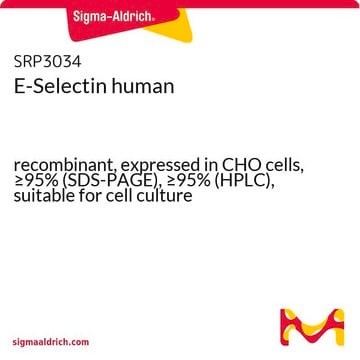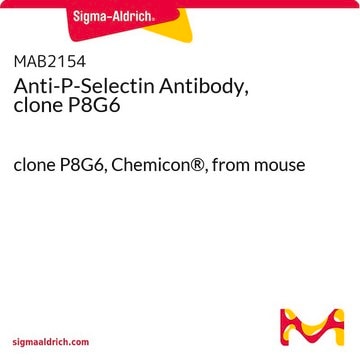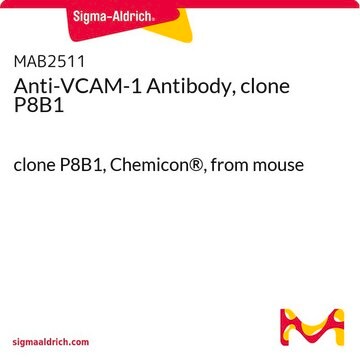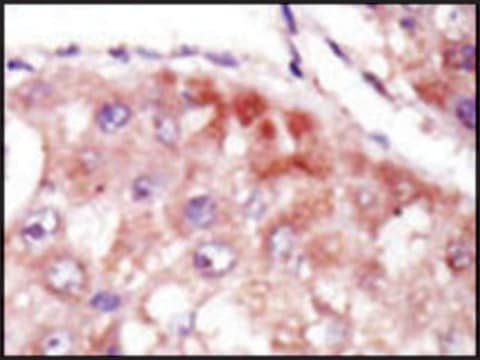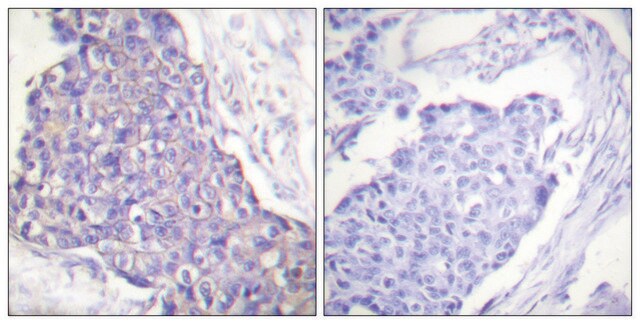S9555
Anti-E-Selectin (CD62E) antibody, Mouse monoclonal
clone 1.2B6, purified from hybridoma cell culture
Sinonimo/i:
Monoclonal Anti-CD62E, Anti-E-Selectin, Anti-ELAM-1
About This Item
Prodotti consigliati
Origine biologica
mouse
Livello qualitativo
Coniugato
unconjugated
Forma dell’anticorpo
purified immunoglobulin
Tipo di anticorpo
primary antibodies
Clone
1.2B6, monoclonal
Forma fisica
buffered aqueous solution
PM
antigen 100-115 kDa
Reattività contro le specie
human, pig
Concentrazione
~2 mg/mL
tecniche
capture ELISA: suitable
flow cytometry: suitable
immunohistochemistry (frozen sections): suitable
immunoprecipitation (IP): suitable
indirect ELISA: suitable
indirect immunofluorescence: 1-2 μg/mL using using 293-T cells transfected with E-selectin fusion protein
western blot: suitable (non-reduced)
Isotipo
IgG1
N° accesso UniProt
Condizioni di spedizione
dry ice
Temperatura di conservazione
−20°C
modifica post-traduzionali bersaglio
unmodified
Informazioni sul gene
human ... SELE(6401)
Cerchi prodotti simili? Visita Guida al confronto tra prodotti
Descrizione generale
It is a 140KDa protein mainly expressed in endothelial cells. E- selectin is characterized with an N-terminal domain, epidermal growth factor (EGF)-like domain, lectin (ligand-binding) domain, variable short consensus repeats and transmembrane domain.
Specificità
Immunogeno
Applicazioni
Azioni biochim/fisiol
Descrizione del bersaglio
Stato fisico
Stoccaggio e stabilità
Esclusione di responsabilità
Non trovi il prodotto giusto?
Prova il nostro Motore di ricerca dei prodotti.
Codice della classe di stoccaggio
10 - Combustible liquids
Classe di pericolosità dell'acqua (WGK)
WGK 3
Punto d’infiammabilità (°F)
Not applicable
Punto d’infiammabilità (°C)
Not applicable
Certificati d'analisi (COA)
Cerca il Certificati d'analisi (COA) digitando il numero di lotto/batch corrispondente. I numeri di lotto o di batch sono stampati sull'etichetta dei prodotti dopo la parola ‘Lotto’ o ‘Batch’.
Possiedi già questo prodotto?
I documenti relativi ai prodotti acquistati recentemente sono disponibili nell’Archivio dei documenti.
Il team dei nostri ricercatori vanta grande esperienza in tutte le aree della ricerca quali Life Science, scienza dei materiali, sintesi chimica, cromatografia, discipline analitiche, ecc..
Contatta l'Assistenza Tecnica.![Anti-CD62E [ELAM-1] Antibody, clone 1.2B6 clone 1.2B6, from mouse](/deepweb/assets/sigmaaldrich/product/images/224/939/8a711839-25ef-4e45-badd-208503950c8a/640/8a711839-25ef-4e45-badd-208503950c8a.jpg)
